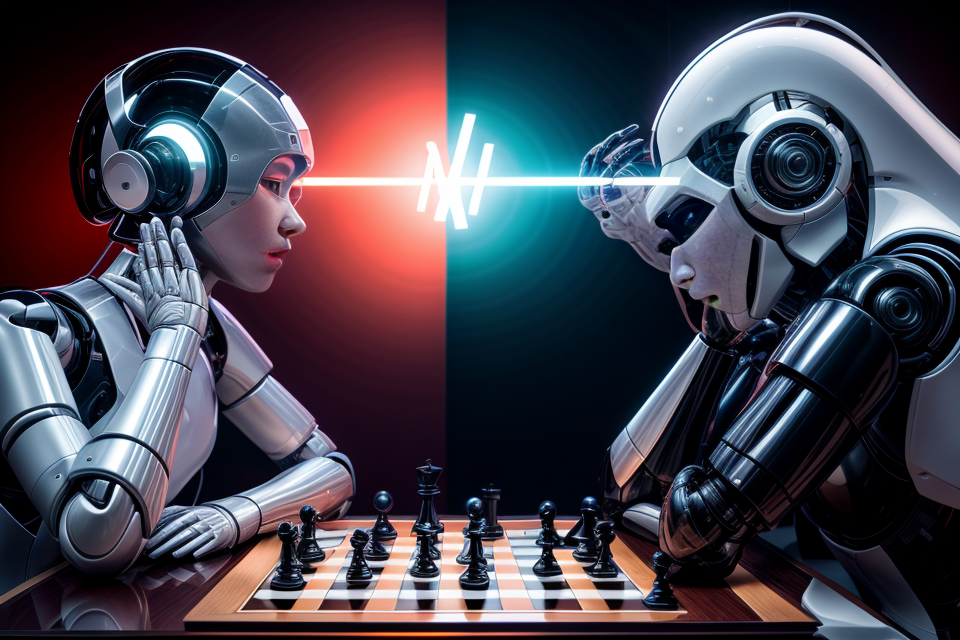
Alan Turing, a British mathematician, cryptanalyst, and computer scientist, is considered by many as the “father of AI.” He made groundbreaking contributions to the field of artificial intelligence and its development. Turing’s work laid the foundation for the modern computer and his ideas on the nature of intelligence continue to shape the field of AI today. This article will explore Turing’s life, work, and influence on the development of AI. We will delve into his contributions to the field, including his famous Turing Test, and examine how his ideas have shaped the future of artificial intelligence. So, let’s dive in and discover the man behind the machine.
The Father of AI: Alan Turing
Early Life and Education
Alan Turing was born in 1912 in London, England. He was the son of a judge and grew up in a well-off family. Turing’s early life was marked by a strong interest in mathematics and logic, which he nurtured throughout his academic career.
Turing’s formal education began at the age of seven when he enrolled at St. Michael’s School in London. It was here that he first developed his love for mathematics and was introduced to the works of famous mathematicians such as Charles Dodgson (Lewis Carroll) and Edith Bunker.
At the age of 16, Turing passed the entrance exam to attend the prestigious University of Cambridge. However, his studies were interrupted by World War I, and he was sent to serve in the British Army.
After the war, Turing returned to his studies at Cambridge, where he focused on mathematics and science. He received a Bachelor of Arts degree in 1930 and a Master of Arts degree in 1932.
Turing then moved to the United States to pursue a PhD in mathematics at the University of Princeton. Under the guidance of mathematician John von Neumann, Turing worked on developing the theory of computability and laid the groundwork for modern computer science.
Turing’s early life and education played a crucial role in shaping his intellect and passion for mathematics, which ultimately led to his groundbreaking contributions to the field of artificial intelligence.
The Turing Test
In 1950, Alan Turing proposed the idea of the Turing Test, a measure of a machine’s ability to exhibit intelligent behavior. The test is based on the notion that if a human evaluator cannot tell the difference between the responses of a machine and a human, then the machine can be said to have passed the test. This concept has become a cornerstone of AI research and development, as it serves as a benchmark for evaluating the intelligence of machines.
The Turing Test is designed to assess a machine’s ability to mimic human-like responses and to demonstrate its capacity for intelligent behavior. The test involves a human evaluator who engages in a natural language conversation with both a human and a machine, without knowing which is which. If the evaluator is unable to distinguish between the two, then the machine is considered to have passed the test.
The Turing Test has been the subject of much debate and criticism over the years, with some arguing that it is an inadequate measure of machine intelligence. However, it remains a widely used and influential concept in the field of AI, and has inspired the development of many other tests and evaluation methods for assessing the intelligence of machines.
In conclusion, the Turing Test is a significant contribution of Alan Turing to the field of AI, and it continues to play a crucial role in shaping the research and development of intelligent machines.
Turing’s Contributions to Cryptography
Alan Turing, a British mathematician, logician, and computer scientist, played a significant role in the development of artificial intelligence (AI). One of his major contributions was in the field of cryptography, which involved the development of a “universal machine” and the cracking of the Enigma code during World War II.
Developed the concept of a “universal machine” in 1936
In 1936, Turing proposed the concept of a “universal machine,” which is now known as the Turing machine. This machine was designed to perform any calculation that could be expressed as a set of rules. It was a theoretical model of computation that could simulate any computer algorithm. Turing’s concept of a universal machine was a significant breakthrough in the development of computing, as it laid the foundation for modern computer science.
Helped crack the Enigma code during World War II
During World War II, Turing was recruited by the British government to work on cracking the Enigma code, which was used by the Germans to encrypt their communications. Turing’s expertise in cryptography was crucial in breaking the code, which allowed the Allies to decipher German messages and gain a significant advantage in the war.
Turing led a team of codebreakers at Bletchley Park, a top-secret facility in England, where they worked on cracking the Enigma code. Turing’s team developed a machine called the Bombe, which was used to decrypt German messages. The Bombe was a remarkable achievement, as it was able to test thousands of possible settings for the Enigma machine each day, significantly reducing the time required to decrypt messages.
Turing’s work on cracking the Enigma code was a major contribution to the Allied war effort. It is estimated that his efforts helped to shorten the war by two years, as the Allies were able to decipher German messages and gain valuable intelligence.
In conclusion, Turing’s contributions to cryptography were instrumental in the development of modern computing and the field of artificial intelligence. His work on the universal machine laid the foundation for modern computer science, while his efforts to crack the Enigma code during World War II were critical to the Allied war effort.
Turing’s Legacy in AI
- Turing’s work laid the foundation for the development of AI
- His research on the Turing Test, which is a test of a machine’s ability to exhibit intelligent behavior equivalent to, or indistinguishable from, that of a human, paved the way for the development of AI systems that could mimic human behavior.
- His work on the theory of computation and the design of algorithms helped to establish the foundations of computer science and made it possible to create efficient and reliable AI systems.
- His ideas and theories continue to influence AI research and development today
- Turing’s concept of “thought experiments,” which involve imagining possible scenarios and their consequences, has been instrumental in the development of AI systems that can think and reason like humans.
- His work on the limits of computation and the nature of intelligence has inspired researchers to explore new approaches to AI, such as deep learning and cognitive computing.
- The Turing Award, given annually for contributions to computer science, is named in his honor
- The Turing Award is considered the highest honor in computer science and has been awarded to many of the most influential figures in the field, including Alan Turing himself, who was posthumously awarded the award in 1968.
- The award is a testament to Turing’s lasting impact on the field of computer science and his role as a founding father of AI.
Alan Turing’s Influence on the AI Community
Pioneers of AI
- In 1955, John McCarthy, Marvin Minsky, and Nathaniel Rochester coined the term “artificial intelligence”
- These pioneers of AI laid the groundwork for the development of the field, through their research and innovation
- The work of Alan Turing was a significant inspiration for these pioneers, motivating them to continue their research and push the boundaries of what was possible in the realm of artificial intelligence.
Modern AI Developments
- Turing’s work on the theoretical foundations of computation and his invention of the Turing machine have had a profound impact on the development of AI.
- The Turing machine, which is a model of computation that uses an unlimited tape of symbols and a reading head to process input, has served as a basis for the design of modern computer algorithms.
- Turing’s ideas about the limits of computation and the concept of a universal machine have influenced the development of AI, particularly in the area of machine learning.
- In recent years, there has been a renewed interest in Turing’s work and his contributions to the field of AI.
- Researchers are now exploring new approaches to AI that are inspired by Turing’s work, such as the use of neural networks and the development of new algorithms that are based on the principles of the Turing machine.
- These developments have led to a new wave of innovation in the field of AI, with new applications and advancements being made regularly.
- The use of AI is now widespread, with applications in a variety of industries, including healthcare, finance, and transportation.
- For example, AI is being used to develop new drugs, improve medical diagnosis, and optimize financial trading.
- Additionally, AI is being used in the development of autonomous vehicles, which has the potential to revolutionize transportation and improve safety on the roads.
- The impact of Turing’s work on the development of AI is ongoing, and it is likely that his contributions will continue to shape the future of the field for years to come.
The Ethics of AI
The Turing Test and Ethics
The Turing Test, proposed by Alan Turing in 1950, is a measure of a machine’s ability to exhibit intelligent behavior that is indistinguishable from that of a human. The test involves a human evaluator who engages in a natural language conversation with both a human and a machine, without knowing which is which. If the machine is able to fool the evaluator into thinking it is human, then it is said to have passed the Turing Test.
While the Turing Test was initially intended as a way to measure the success of AI, it has since become a subject of ethical debate. One of the main concerns is the potential for AI to be used in decision-making processes that may have serious consequences for humans. For example, if an AI system is used to make decisions about hiring or loan approvals, there is a risk that it may perpetuate biases and discrimination.
Furthermore, the Turing Test raises questions about the nature of intelligence and consciousness. If a machine is able to pass the test, does it mean that it is truly intelligent or simply mimicking human behavior? This raises ethical concerns about the treatment of AI and whether it should be granted the same rights and protections as humans.
Overall, the Turing Test serves as a reminder of the need for ethical guidelines in the development and use of AI. There is ongoing debate about the potential dangers of AI and the need for safeguards to ensure that it is used in a responsible and ethical manner.
AI and Human Values
As AI becomes more advanced, it is important to consider the impact it will have on society. AI has the potential to transform many aspects of our lives, from healthcare and transportation to education and entertainment. However, it is crucial to ensure that AI is developed and used in a way that aligns with human values and ethics. This will require ongoing dialogue and collaboration between AI researchers, policymakers, and the public.
Some key considerations when it comes to AI and human values include:
- Privacy: As AI systems collect and process vast amounts of data, it is essential to ensure that individuals’ privacy is protected. This means developing privacy-preserving techniques and establishing clear guidelines for data collection and use.
- Bias: AI systems can perpetuate and even amplify existing biases, such as those based on race, gender, or socioeconomic status. It is crucial to identify and address these biases to ensure that AI is fair and equitable.
- Accountability: AI systems must be designed in a way that allows for accountability. This means ensuring that the actions of AI systems can be traced back to their human creators and that there are mechanisms in place for addressing any harm caused by AI.
- Transparency: AI systems should be transparent in their decision-making processes. This means providing explanations for how and why decisions are made, allowing for human oversight and intervention when necessary.
- Value alignment: AI systems should be aligned with human values, such as compassion, fairness, and respect for human rights. This requires ongoing dialogue and collaboration between AI researchers, policymakers, and the public to ensure that AI is developed in a way that reflects our shared values.
In conclusion, as AI continues to advance, it is essential to consider the impact it will have on society and to ensure that it is developed and used in a way that aligns with human values and ethics. This will require ongoing dialogue and collaboration between AI researchers, policymakers, and the public to identify and address any potential risks or harms associated with AI.
FAQs
1. Who is Alan Turing?
Alan Turing was a British mathematician, computer scientist, and logician who played a crucial role in the development of artificial intelligence (AI). He is considered one of the founding figures of AI and is known for his work on the theoretical foundations of computing and the design of the first modern computer.
2. What were Turing’s contributions to AI?
Turing made significant contributions to the field of AI, including the development of the Turing Test, a thought experiment that proposed a way to determine whether a machine could exhibit intelligent behavior indistinguishable from a human. He also proposed the idea of a universal Turing machine, which could simulate any other machine and is considered a fundamental concept in the study of computation.
3. How did Turing’s work influence the development of AI?
Turing’s work laid the foundation for the modern field of AI and his ideas continue to shape the way we think about intelligence and computation. His work on the Turing Test helped to establish the field of natural language processing and his ideas about the universal Turing machine were foundational for the development of modern computer architectures.
4. When did Turing live?
Turing was born in 1912 and died in 1954. He lived during a time of significant technological change and was part of a group of pioneering thinkers who helped to shape the field of computer science.
5. What challenges did Turing face in his work?
Turing faced many challenges in his work, including limited resources and a lack of support from some of his colleagues. He also had to contend with the social and legal challenges of being a gay man in a time when homosexuality was illegal in the UK. Despite these challenges, Turing made significant contributions to the field of AI and his work continues to be recognized and celebrated today.


